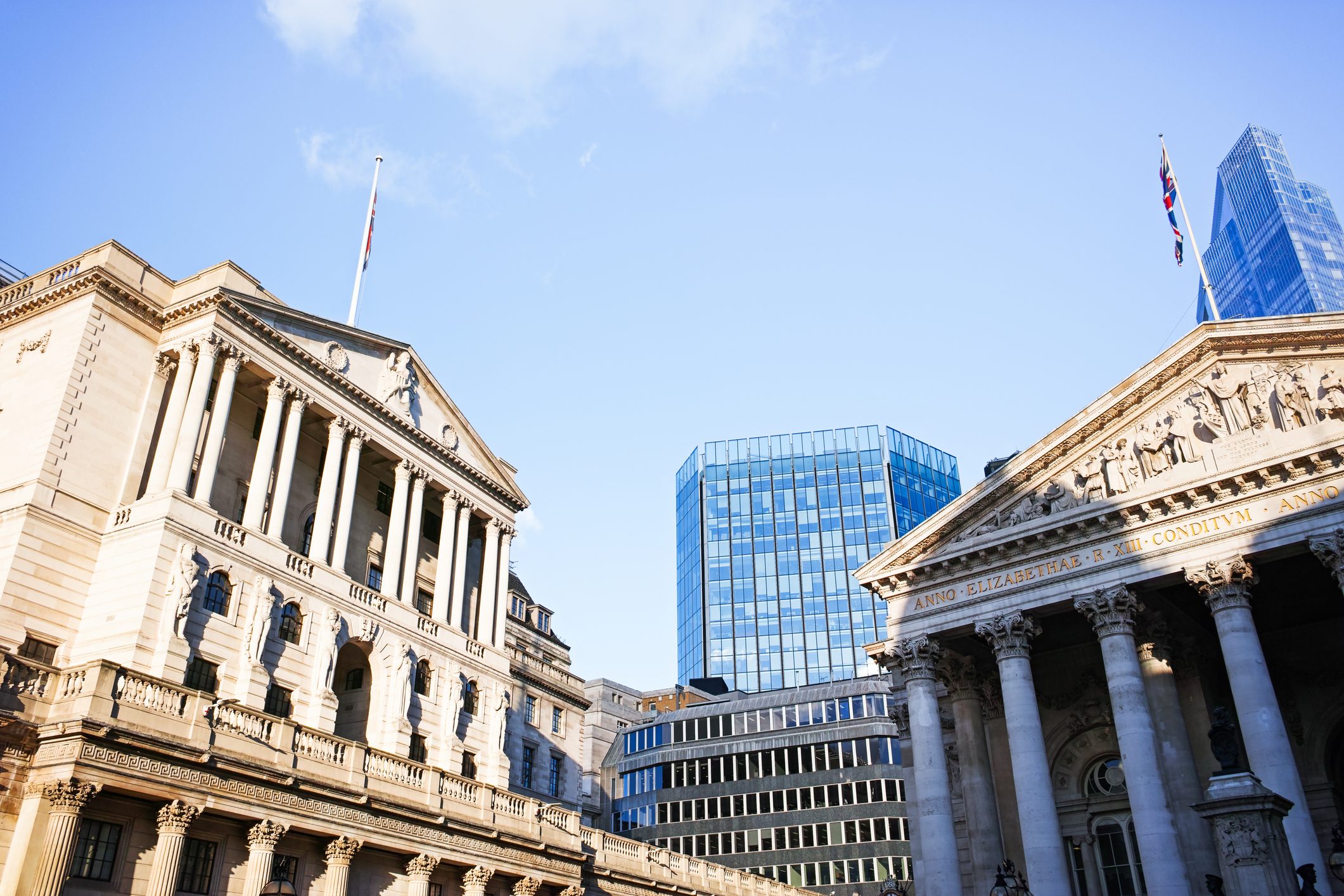Interest rates held at 5.25% again – is a cut coming?
The Bank of England’s Monetary Policy Committee has held interest rates at 5.25% for the third consecutive meeting – what does it mean for your money?


Get the latest financial news, insights and expert analysis from our award-winning MoneyWeek team, to help you understand what really matters when it comes to your finances.
You are now subscribed
Your newsletter sign-up was successful
Want to add more newsletters?

Twice daily
MoneyWeek
Get the latest financial news, insights and expert analysis from our award-winning MoneyWeek team, to help you understand what really matters when it comes to your finances.

Four times a week
Look After My Bills
Sign up to our free money-saving newsletter, filled with the latest news and expert advice to help you find the best tips and deals for managing your bills. Start saving today!
Interest rates have been held by the Bank of England (BoE) for the third time in a row.
The Bank of England's Monetary Policy Committee announced today that interest rates will remain at their 15-year high of 5.25%.
The move was expected by the markets, with analysts now anticipating when interest rates will be cut next year.
MoneyWeek
Subscribe to MoneyWeek today and get your first six magazine issues absolutely FREE

Sign up to Money Morning
Don't miss the latest investment and personal finances news, market analysis, plus money-saving tips with our free twice-daily newsletter
Don't miss the latest investment and personal finances news, market analysis, plus money-saving tips with our free twice-daily newsletter
MPC members voted by 6-3 to hold rates, with three people voting to raise the cost of borrowing to 5.5%.
Its report highlighted that slowing inflation and wage growth suggest the BoE's current stance is "restrictive," removing some of the pressure to raise rates further.
Inflation has dropped to its lowest level for two years, at 4.6% in the 12 months to October, while GDP also unexpectedly shrank by 0.3% and wage growth fell to 7.3% - the steepest drop for two years.
Bank of England governor Andrew Bailey was non-committal on the prospect of rate cuts.
"We’ve come a long way this year, and successive rate increases have helped bring inflation down from over 10% in January to 4.6% in October, but there is still some way to go," he says.
“We’ll continue to watch the data closely, and take the decisions necessary to get inflation all the way back to 2%.”
What is the outlook for interest rates?
Attention has now turned to when rates will be cut rather than if they will be raised again.
The Federal Reserve also kept rates unchanged in the US this week and suggested a discussion on cuts is “coming into view.”
The BoE is expected to follow suit eventually, although there were no votes for a cut at its latest meeting.
"The prevailing sentiment among market analysts is it is not a case of 'if' the Bank of England will cut interest rates, but 'when,'" says Myron Jobson, senior personal finance analyst at interactive investor.
"Serious cracks in the UK economy are starting to show, with gross domestic product falling more than expected.
"This, along with the easing of inflation, could suggest that interest rates don’t need to go higher to slam the brakes on the economy even more – but this is not a forgone conclusion."
Nicholas Hyett, investment manager at Wealth Club, says there is logic to holding rates steady at the moment.
"Central banks have a history of folding under the economic pressure and declaring victory on inflation too early," he says.
"But leave rate cuts too long and there’s a risk the interest rate cure becomes worse than the inflationary disease.”
Hetal Mehta, head of economic research at St. James’s Place, said the decision to maintain a hawkish message sets the BoE apart from the Fed.
"Underlying inflation is still uncomfortably high and the recent pricing of multiple rate cuts from early next year was clearly an easing of financial conditions that the BoE felt the need to push back against," he says.
"The fall in wage inflation so far is not enough to be consistent with the 2% inflation target.”
What the rate freeze means for homeowners
The latest interest rate decision is good news for borrowers on tracker mortgages as it means their monthly repayments won’t rise and they may be more optimistic of them eventually falling if rates are cut next year.
There are also signs that the hold on the cost of borrowing is feeding into lower mortgage rates, with the average two-year fix falling below 6% for the first time since June.
Karen Noye, mortgage expert at wealth manager Quilter, suggests the further pause may boost housing market confidence.
"More potential buyers should start to feel confident about entering the market, potentially sustaining or even boosting housing prices," she says.
"Recent house price indices have shown that as a result of limited housing stock prices have modestly increased.
"However, the broader economic context remains challenging. The ongoing cost-of-living squeeze, with rising energy costs and still relatively high mortgage rates continue to strain household budgets. This suggests that while the interest rate hold may bring some stability, many households will still face significant financial pressures as we enter into the new year."
Sarah Coles, senior personal finance analyst for Hargreaves Lansdown, said borrowers coming to the end of a fixed rate deal may now be tempted to take on a variable product in the hope that rates drop in the coming months.
"However, there are no guarantees. If you’re worried about uncertainty, you might opt for a fixed rate deal," she says.
"Of course, for anyone who fixed two years ago or more, even after the falls of recent weeks, a remortgage is going to be incredibly painful, because they’re likely to have fixed for less than 2%.
"We’ve seen nosebleed-inducing ups and downs in the mortgage market over the past two years – with two-year fixed rate deals hitting a recent peak of 6.85% at the start of August, before dropping back below 6%. However, this is a completely different mortgage landscape to two years ago, and there’s no expectation that we’ll return to the good old days in a particular hurry.”
What the rate freeze means for savers.
Savers have slowly been benefiting from interest rate rises, with savings rates at their highest for 15 years.
Some easy-access savings accounts are paying above 5%, while you can get around 5.55% on a one-year fix and 8% on the best regular saver account.
These rates currently beat inflation.
However, as inflation falls and rates continue to be held, some of the best deals on the market are disappearing.
So, if you spot a savings account you like, you may need to act fast.
"While fixed-rate deals of 6% plus became a feature in the summer months, these offers have already disappeared and with rate cuts expected next year, savings rates are likely to ease further from here," says Alice Haine, personal finance analyst for Bestinvest.
"Savers with money sitting idle in accounts offering dismal returns should nab a top fixed-rate deal while they still can."
Get the latest financial news, insights and expert analysis from our award-winning MoneyWeek team, to help you understand what really matters when it comes to your finances.

Marc Shoffman is an award-winning freelance journalist specialising in business, personal finance and property. His work has appeared in print and online publications ranging from FT Business to The Times, Mail on Sunday and the i newspaper. He also co-presents the In For A Penny financial planning podcast.
-
 Should you buy an active ETF?
Should you buy an active ETF?ETFs are often mischaracterised as passive products, but they can be a convenient way to add active management to your portfolio
-
 Power up your pension before 5 April – easy ways to save before the tax year end
Power up your pension before 5 April – easy ways to save before the tax year endWith the end of the tax year looming, pension savers currently have a window to review and maximise what’s going into their retirement funds – we look at how
-
 Why Scotland's proposed government bonds are a terrible investment
Why Scotland's proposed government bonds are a terrible investmentOpinion Politicians in Scotland pushing for “kilts” think it will strengthen the case for independence and boost financial credibility. It's more likely to backfire
-
 How have central banks evolved in the last century – and are they still fit for purpose?
How have central banks evolved in the last century – and are they still fit for purpose?The rise to power and dominance of the central banks has been a key theme in MoneyWeek in its 25 years. Has their rule been benign?
-
 Brits leave £31.6 billion in savings accounts paying 1% interest or less – do you need to switch?
Brits leave £31.6 billion in savings accounts paying 1% interest or less – do you need to switch?Eight million Brits hold money in savings accounts that pay 1% interest or less, meaning the value of their cash is being eroded by inflation.
-
 Buying vs renting: is is better to own or rent your home?
Buying vs renting: is is better to own or rent your home?The higher mortgage rates of recent years have actually made renting comparatively cheaper, analysis suggests. But there are hidden costs to long term renting.
-
 UK to have highest inflation among advanced economies this year and next, says IMF
UK to have highest inflation among advanced economies this year and next, says IMFThe International Monetary Fund (IMF) says it expects inflation to remain high in the UK, while lowering economic growth forecasts for 2026.
-
 Hargreaves Lansdown launches first cash ISA – how does it compare?
Hargreaves Lansdown launches first cash ISA – how does it compare?Hargreaves Lansdown is offering an own brand cash ISA for the first time with their new easy-access account. How does the interest rate compare to other products?
-
 Is Britain heading for a big debt crisis?
Is Britain heading for a big debt crisis?Opinion Things are not yet as bad as some reports have claimed. But they sure aren’t rosy either, says Julian Jessop
-
 'Britain is on the road to nowhere under Labour'
'Britain is on the road to nowhere under Labour'Opinion Britain's economy will shake off its torpor and grow robustly, but not under Keir Starmer's leadership, says Max King